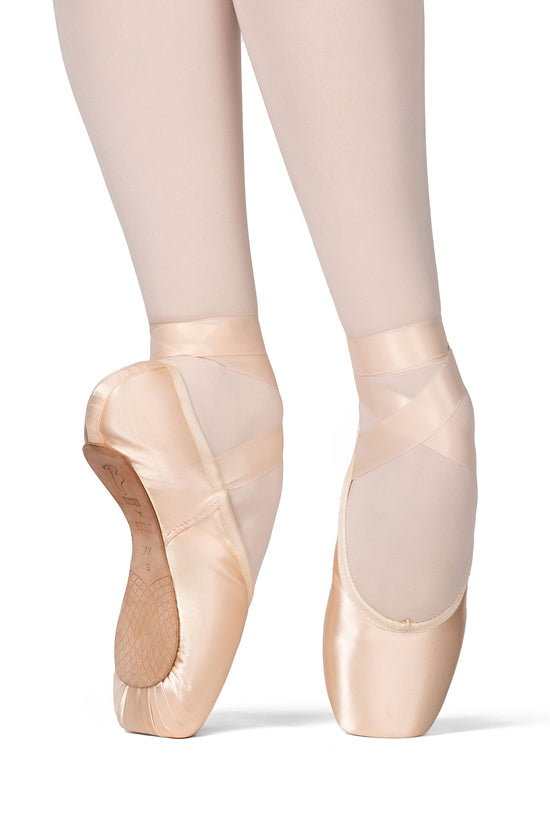The tape that finishes the top edge of the upper which also encases the drawstring.
POINTE SHOE GUIDE
Since 1932, when our founder Jacob Bloch created his very first pointe shoe, Bloch has consistently led the way in innovating these iconic ballet essentials. Our pointe shoes adorn the feet of renowned dance professionals in companies worldwide, as well as countless aspiring ballet students.
Crafted by hand from luxurious satin, Bloch's ballet pointe shoes harmonise impeccable craftsmanship with dancer-centric comfort. Each Bloch pointe shoe is meticulously designed, considering every aspect of its anatomy.
For the best experience, we wholeheartedly recommend that dancers pay a visit to one of our Bloch Stores, where our highly skilled team can provide you with a professional fitting.

Anatomy of a Pointe Shoe
1 – Throat Line
2 – Block/Box
3 – Modified Vamp
4 – Shank/Insole*
5 – Sock
6 – Drawstring
7 – Binding
8 – Vamp
9 – Platform
10 – Wing
11 – Side Seam
12 – Pleats
13 – Outsole
14 – Heel Strap
* Concealed inside under the sock
Pointe Shoe Overview
Learn more about the individual features of each pointe shoe we offer
-
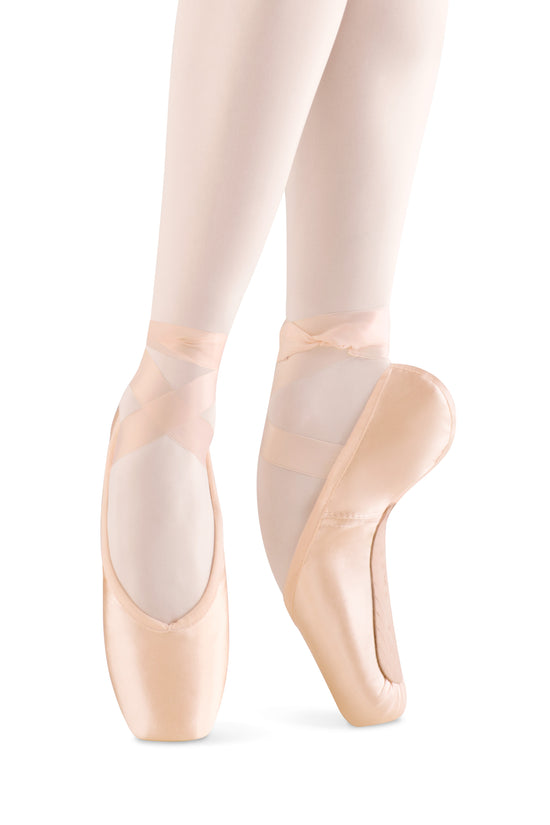
ALPHA
S0104
— Medium Shank
— Oval Platform
— B Paste
— U-Shape Vamp
— Medium Box
— Suitable for all feet types
— Has ¾ outsole design with full insole
-
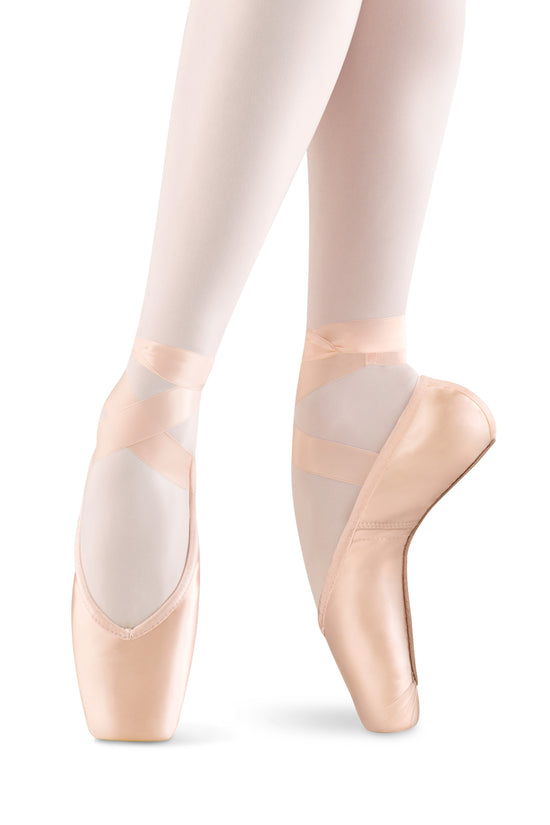
AMELIE SOFT
S0102
— Flexible Shank
— Oblong Platform
— B Paste
— Slight V-Shape Vamp
— Tapered Box
— Suitable for all feet types
— Flexible shoe for easy arching
-
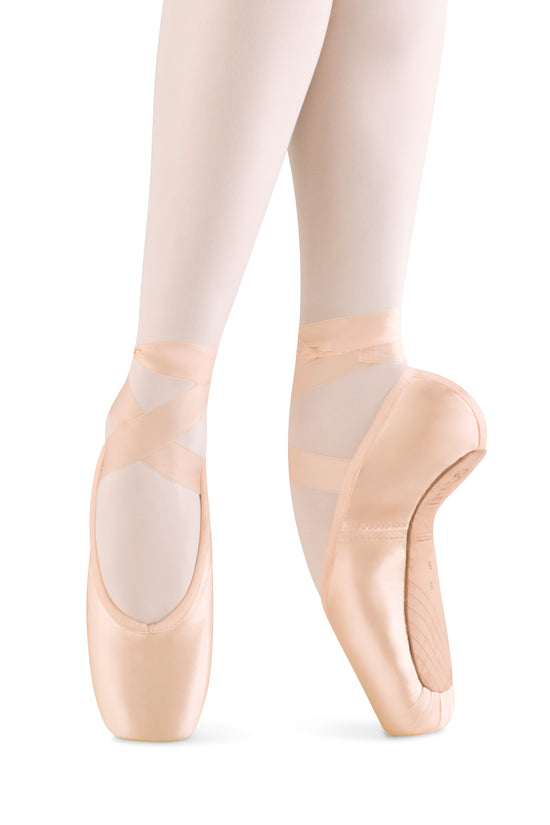
ASPIRATION
S0105
— Medium Hard Shank
— Wide Platform
— A Paste
— U-Shape Vamp
— Wide Box
— Suitable for all feet types
— Designed to allow ¾ bend at dancer’s arch
-
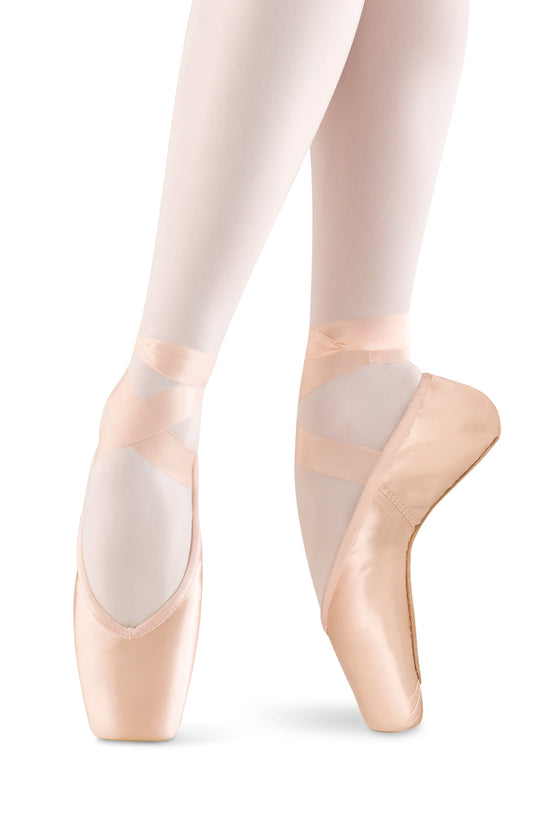
AXIOM
S0108
— Medium Shank
— Oblong Platform
— B Paste
— Slight V-Shape Vamp
— Medium Box
— Suitable for Greek & Egyptian feet types
— Angled side seams, with heel cushion
-
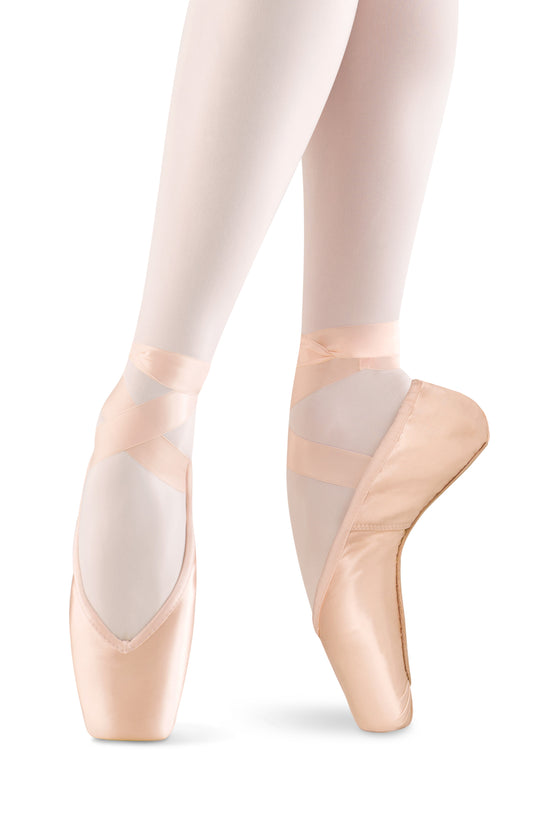
SERENE V
S0141V
— Medium Shank
— Oblong Platform
— A Paste
— V-Shape Vamp
— Medium Box
— Suitable for all feet types
— Very supportive Box with Wings
-
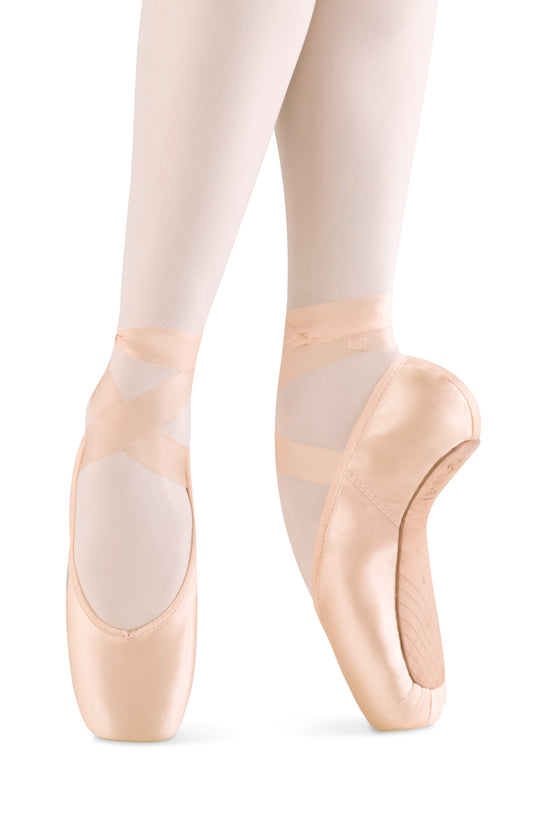
EUROPEAN BALANCE
S0160
— Medium, gently curved Shank
— Wide & Deep Platform
— A Paste
— Open U-Shape Vamp
— Wide Box
— Suitable for Giselle feet types
— Curved Last, Inner rub toe cushion
-
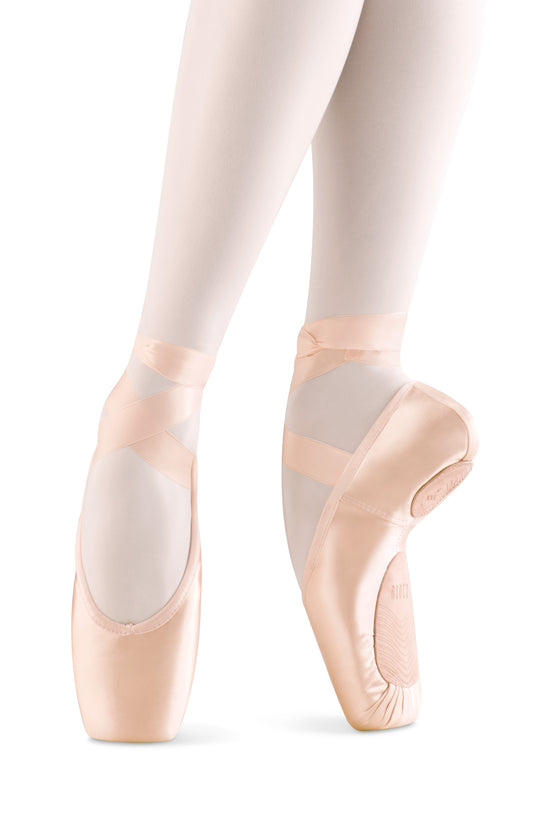
EUROSTRETCH
S0172
— Flexible Shank
— Wide & Deep Platform
— A Paste
— Open U-Shape Vamp
— Wide Box
— Suitable for all feet types
— Curved split sole, Inner rubber toe cushion
-
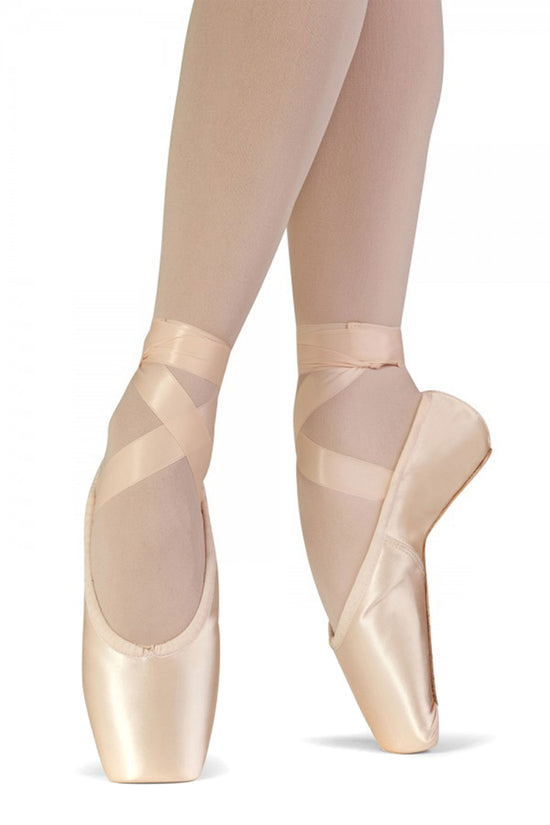
SYNTHESIS
S0175
— Relevéase Shank
— Oblong Platform
— A Paste
— U-Shape Vamp
— Suitable for all feet types
— Noise reduction pleats
-
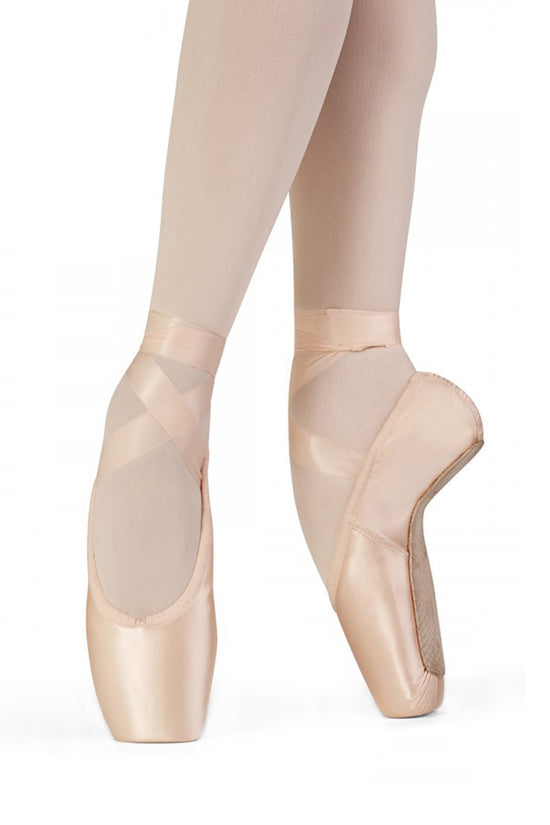
GRACE
S0161
— Medium Shank
— Wide Deep & Flat Platform
— A Paste
— U-Shape Vamp
— Suitable for all feet types
— Inner rubber toe cushion, pleats to lessen noise.
-
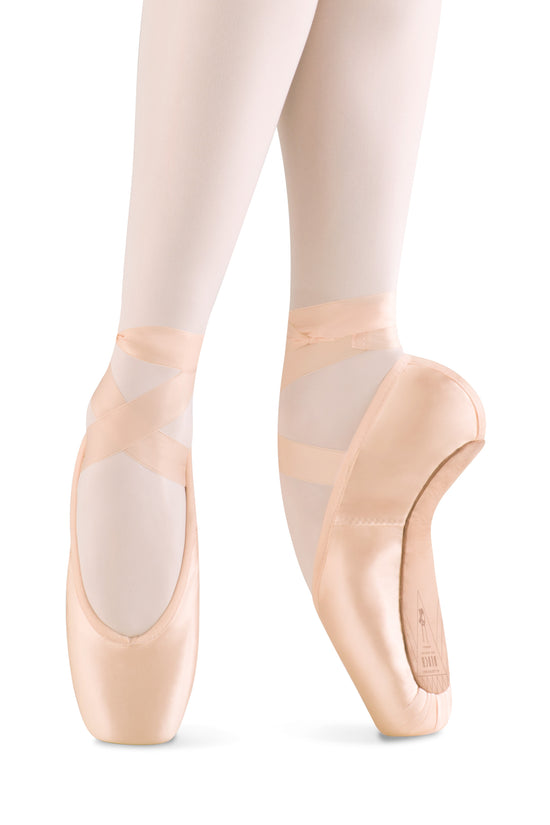
SONATA
S0130
— Medium Shank
— Oval Platform
— A Paste
— U-Shape Vamp
— Medium Box
— Suitable for all feet types
— No tack at the heel allows ¾ bend Inner rubber toe cushion
-
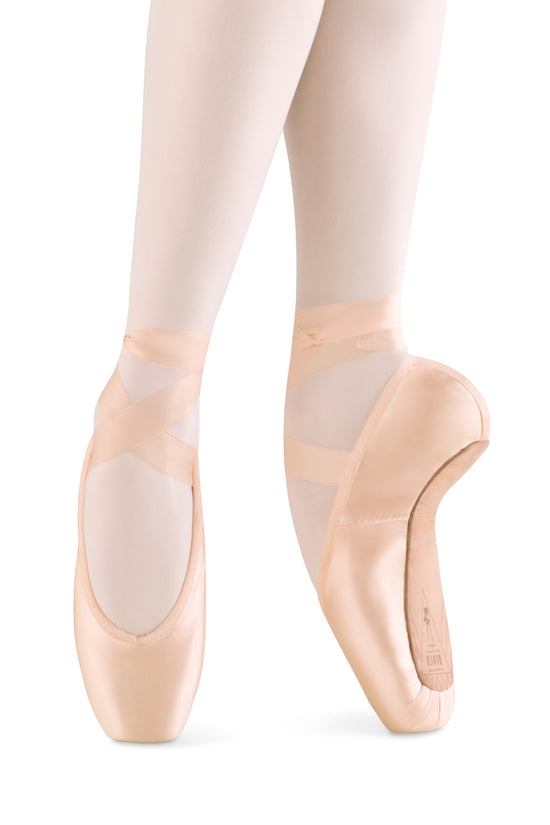
SUPRIMA
S0132
— Medium Shank
— Round Platform
— A Paste
— U-Shape Vamp
— Medium Box
— Suitable for Greek & Egyptian feet types
— Suits slender feet. Available in strong Shank
-
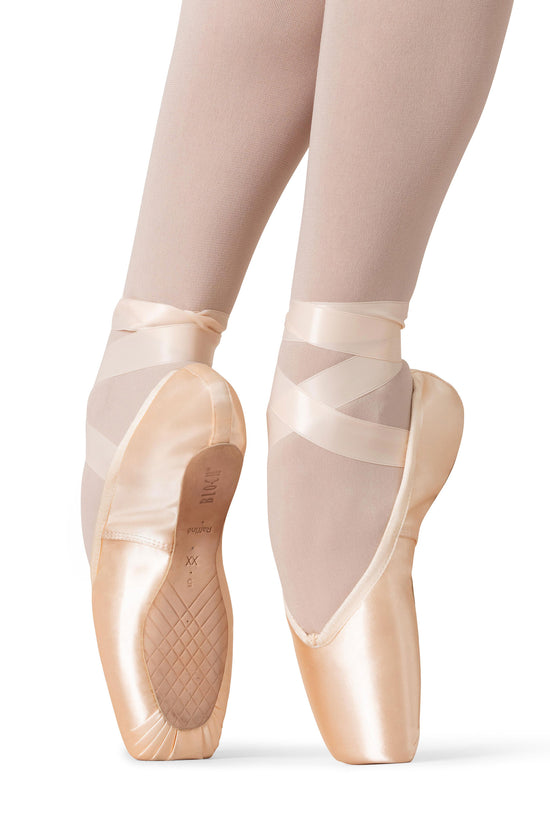
RAFFINÉ
S0181
— Firm Shank
— Medium & Tapered Platform
— A Paste
— V-Shape Vamp
— Shorter Box
— Suitable for all feet types
— Noise reduction pleats
-
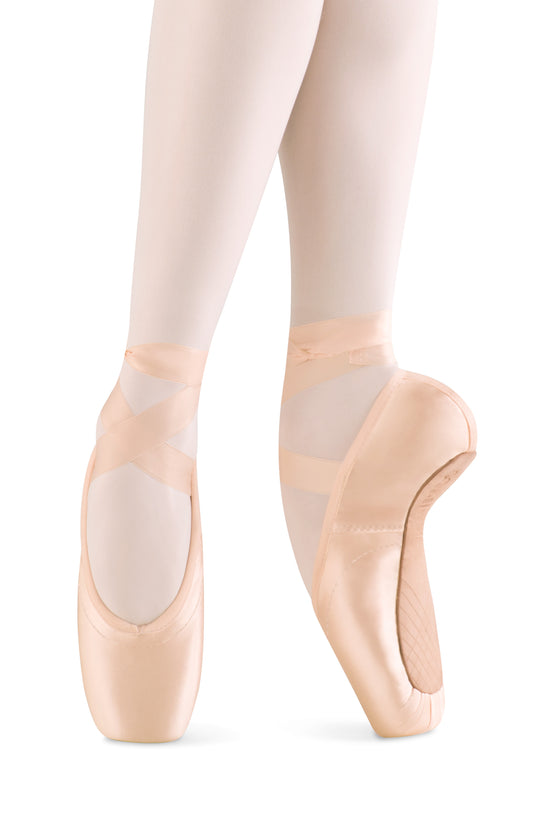
SYNERGY
S0100
— Medium Shank
— Wide Platform
— B Paste
— U-Shape Vamp
— Suitable for all feet types
— Stitched in Box for firm support
-
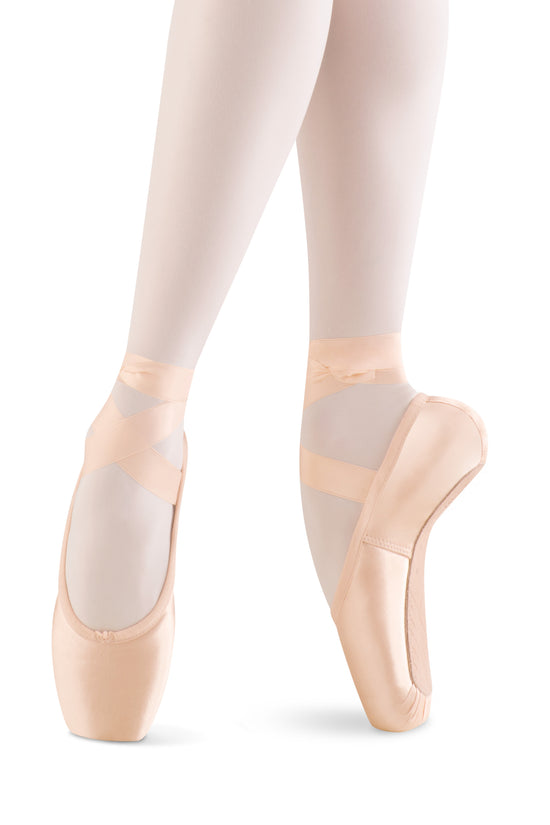
MIRELLA WHISPER
SM140/SM141
— Medium Shank
— Wide & Deep Platform
— A Paste
— U-Shape Vamp
— Suitable for all feet types
— Special fabric below pleats to lessen noise. Available in matte (SM141)
-
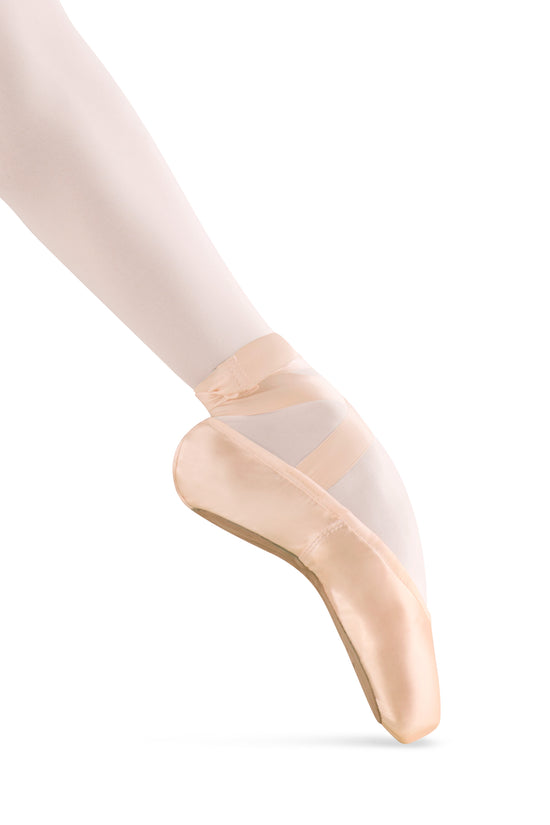
Soft Sole Demi Pointe
S0134
— Soft Shank
— Oval Platform
— A Paste
— U-Shape Vamp
— Suitable for all feet types
— Low cut sides and accentuates the profile of the foot
-
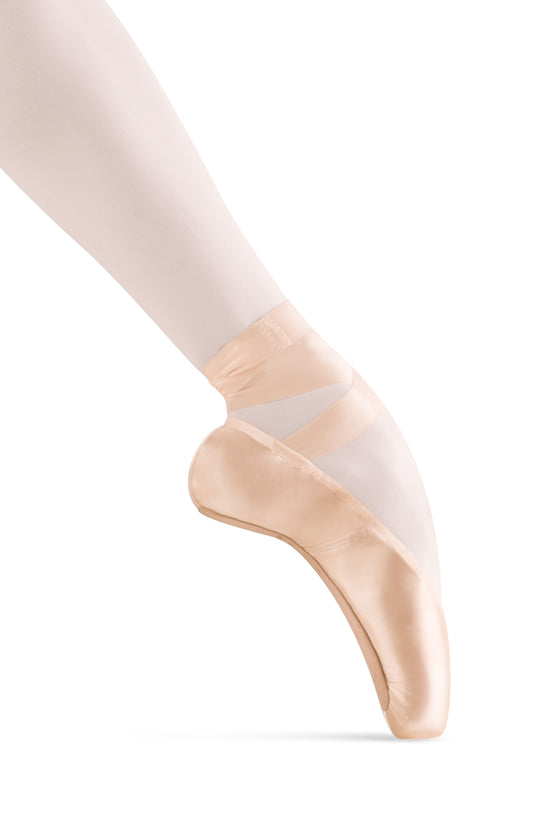
Demi Pointe
S0135
— Medium Shank
— Oval Platform
— A Paste
— U-Shape Vamp
— Deep Box
— Suitable for all feet types
— Resistance of the leather Outsole ensures that maximum strength is gained
-
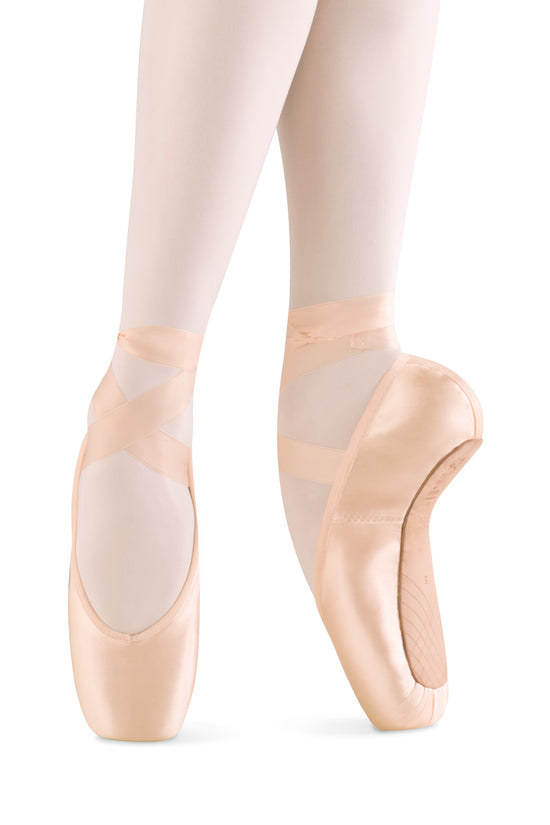
HANNAH
S0109
— Flexible Shank
— Wide & Deep Platform
— A Paste
— U-Shape Vamp
— Medium Box
— Suitable for all feet types
— Very flexible shank
-
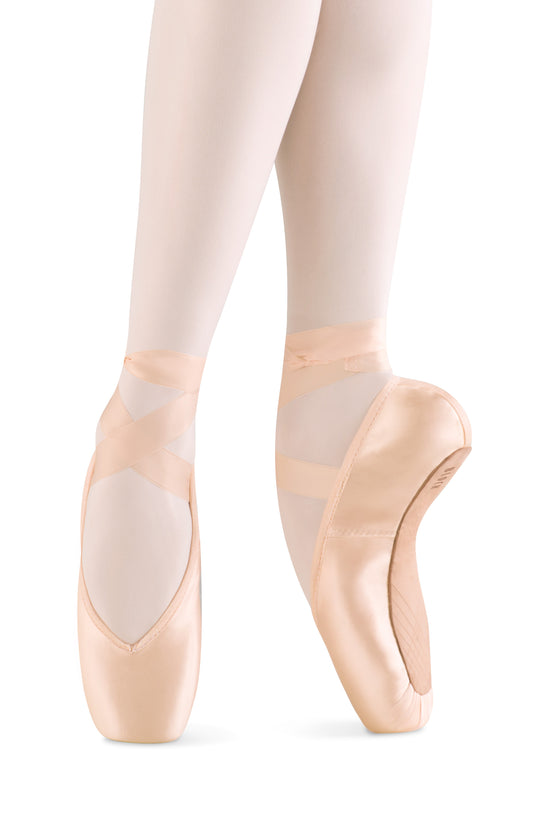
HERITAGE
S0180
— Medium, gently curved Shank
— Oblong Platform
— A Paste
— V-Shape Vamp
— Shorter Box
— Suitable for all feet types
— Flat Outsole, heel cushion, Inner toe rubber cushion
-
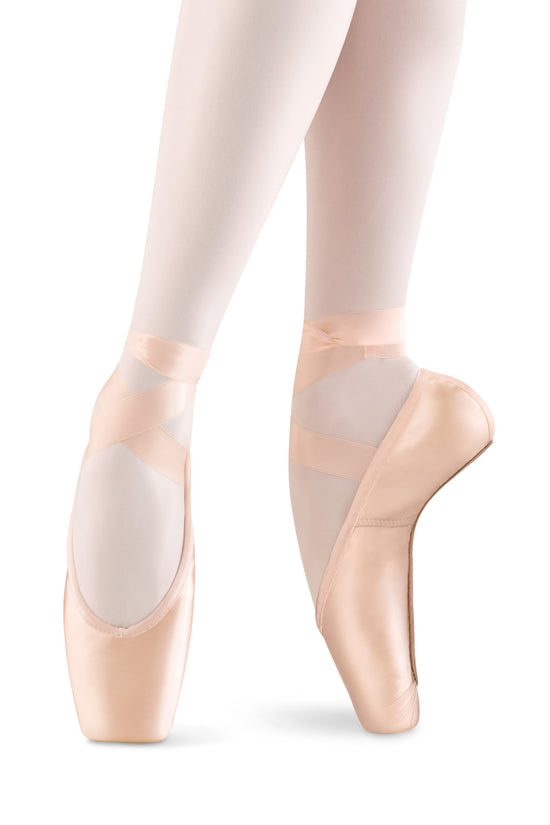
SERENADE
S0131
— Medium Shank
— Oblong Platform
— A Paste
— U-Shape Vamp
— Medium Box
— Suitable for all feet types
— Available in strong Shank
-
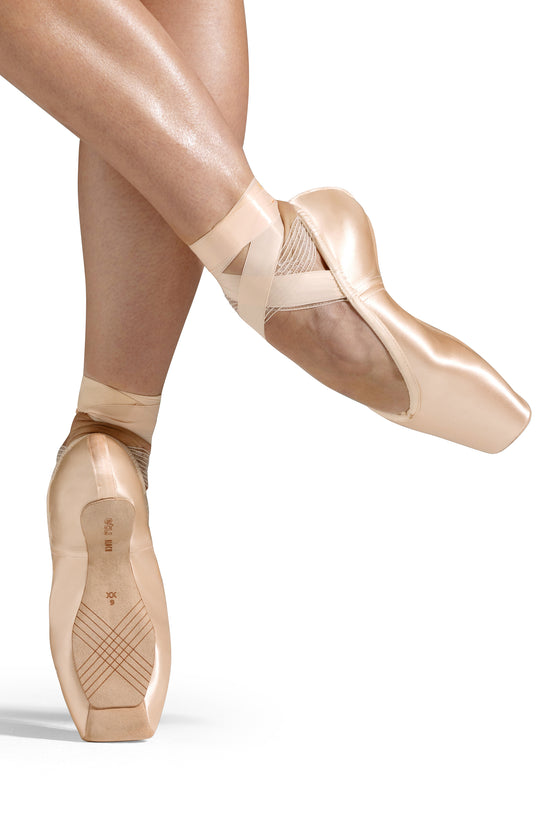
ETU
S1160
— Medium Shank
— Wide Platform
— Slight U-shaped Vamp
— Non-traditional toe box
— Suitable for all feet types
— PORON® cushioning, Pleatless construction, Wrinkle-proof reinforced satin, Tapered & Curved Last
Glossary of Terms
Brush up on your pointe shoe terminology
The hardened surface area of a pointe shoe which includes the vamp, wings and platform, surrounds the front section of the foot. TheBlock/Boxis made from the application of numerous layers of special fabrics, all with different shapes, bound together by the paste in between each layer. This process is very similar to the process of papier maché.
A length of either cotton cord or elastic cord encased within the binding that allows the upper to form a snug fit around the foot.
A satin tab which is sewn over the joining seams of the back uppers.
A specially formulated glue type substance, which is used in both the process of hardening the toe Block/Box and attaching the insole to the inside of the pointe shoe.
The flattened surface at the toe end of the pointe shoe which allows the dancer to balance ‘en pointe’.
The measured pleating which draws the satin over the Box which meets the Outsole.
A combination of layers of special materials into a unique profile which forms the structural anchor similar to the way a spine supports the human body. Shanks/insoles are developed in different profiles creating various levels of flexibility.
The stitching on the side seam is a double French stitch which ensures strength and sews front Upper to the back Upper.
A thin suede or cotton fabric covering the inner shank.
All the parts above the shoe’s sole that are joined together to become a single unit which is then attached to the Outsole.
The lower forward part of the shoe’s upper, covering the forepart of the foot and includes the Block/Box and Platform.
The measurement from the centre middle of the drawstring to the edge of the Platform.
The shape of the entrance area for the front of the foot. In Bloch pointe shoes the Vamp shape is either ‘U’ shaped or ‘V’ shaped.
Each of the two symmetrical sides of the vamp directed toward the heel. The outer edge of the hardened toe Block/Box that contain a lesser amount of material and paste. The Wings can vary in shape and hardness depending on the style of pointe shoe or the dancers preference.

Foot Shapes
Note the overall shape of toe tips as well as the width at point A and point B. Both Greek and Egyptian shapes have a narrow tip and wide tip types.

Pointe Shoe Width
Bloch pointe shoes are available in up to four different widths.
Bloch pointe shoe widths can be identified in three different ways depending on the style. Some of the earlier developed styles denote widths with the A, B, C, D, E format and the later styles with either X or Y formats. With the different styles, widths and sizes available, Bloch offers over 1000 variations of pointe shoes.
Pointe Shoe Size Conversion Guide
| FRACTIONAL (US /AUS) | 4 | 4½ | 5 | 5½ | 6 | 6½ | 7 | 7½ | 8 | 8½ | 9 | 9½ | 10 | 10½ | 11 | 11.5 | ||
|---|---|---|---|---|---|---|---|---|---|---|---|---|---|---|---|---|---|---|
| STRAIGHT (UK) | 1 | 1½ | 2 | 2½ | 3 | 3½ | 4 | 4½ | 5 | 5½ | 6 | 6½ | 7 | 7½ | 8 | 8½ | 9 | 9.5 |
| EUROPEAN | 34 | 34½ | 35 | 35½ | 36 | 36½ | 37 | 37½ | 38 | 38½ | 39 | 39½ | 40 | 40½ | 41 | 41½ | 42 | 42½ |
| S0104 Alpha | 2 | 2½ | 3 | 3½ | 4 | 4½ | 5 | 5½ | 6 | 6½ | 7 | 7½ | 8 | 8½ | 9 | |||
| S0103 Amelie | 2 | 2½ | 3 | 3½ | 4 | 4½ | 5 | 5½ | 6 | 6½ | 7 | 7½ | 8 | |||||
| S0102 Amelie soft | 2 | 2½ | 3 | 3½ | 4 | 4½ | 5 | 5½ | 6 | 6½ | 7 | 7½ | 8 | |||||
| S0105 Aspiration | 2 | 2½ | 3 | 3½ | 4 | 4½ | 5 | 5½ | 6 | 6½ | 7 | 7½ | 8 | 8½ | 9 | |||
| S0108 Axiom | 2 | 2½ | 3 | 3½ | 4 | 4½ | 5 | 5½ | 6 | 6½ | 7 | 7½ | 8 | |||||
| S0137 Concerta | 2 | 2½ | 3 | 3½ | 4 | 4½ | 5 | 5½ | 6 | 6½ | ||||||||
| S1160LTHM Etu | 3 | 3½ | 4 | 4½ | 5 | 5½ | 6 | 6½ | 7 | 7½ | 8 | |||||||
| S0160 European Balance | 2 | 2½ | 3 | 3½ | 4 | 4½ | 5 | 5½ | 6 | 6½ | 7 | 7½ | 8 | |||||
| S0162LA Balance Lisse | 3 | 3½ | 4 | 4½ | 5 | 5½ | 6 | 6½ | 7 | 7½ | 8 | |||||||
| S0172 Eurostretch | 2 | 2½ | 3 | 3½ | 4 | 4½ | 5 | 5½ | 6 | 6½ | 7 | 7½ | 8 | |||||
| S0161 Grace | 2 | 2½ | 3 | 3½ | 4 | 4½ | 5 | 5½ | 6 | 6½ | 7 | 7½ | 8 | |||||
| S0109 Hannah | 2 | 2½ | 3 | 3½ | 4 | 4½ | 5 | 5½ | 6 | 6½ | 7 | 7½ | 8 | |||||
| S0180 Heritage | 2 | 2½ | 3 | 3½ | 4 | 4½ | 5 | 5½ | 6 | 6½ | 7 | 7½ | 8 | 8.5 | 9 | 9.5 | 10 | |
| S0129 Jetstream | 2 | 2½ | 3 | 3½ | 4 | 4½ | 5 | 5½ | 6 | 6½ | 7 | 7½ | 8 | |||||
| S0181 Raffiné | 3 | 3½ | 4 | 4½ | 5 | 5½ | 6 | 6½ | 7 | 7½ | 8 | 8.5 | ||||||
| S0131 Serenade | 1 | 1½ | 2 | 2½ | 3 | 3½ | 4 | 4½ | 5 | 5½ | 6 | 6½ | 7 | 7½ | 8 | 8½ | 9 | |
| S0141V Serene V | 2 | 2½ | 3 | 3½ | 4 | 4½ | 5 | 5½ | 6 | 6½ | 7 | 7½ | 8 | 8½ | 9 | |||
| S0130 Sonata | 2 | 2½ | 3 | 3½ | 4 | 4½ | 5 | 5½ | 6 | 6½ | 7 | 7½ | 8 | 8½ | 9 | |||
| S0132 Suprima | 1 | 1½ | 2 | 2½ | 3 | 3½ | 4 | 4½ | 5 | 5½ | 6 | 6½ | 7 | 7½ | 8 | 8½ | 9 | |
| S0133 Sylphide | 1 | 1½ | 2 | 2½ | 3 | 3½ | 4 | 4½ | 5 | 5½ | 6 | 6½ | 7 | 7½ | 8 | |||
| S0100 Synergy | 2 | 2½ | 3 | 3½ | 4 | 4½ | 5 | 5½ | 6 | 6½ | 7 | 7½ | 8 | |||||
| S0175 Synthesis | 3 | 3½ | 4 | 4½ | 5 | 5½ | 6 | 6½ | 7 | 7½ | 8 | |||||||
| SM140/SM141 Whisper | 2 | 2½ | 3 | 3½ | 4 | 4½ | 5 | 5½ | 6 | 6½ | 7 | 7½ | 8 | |||||
| S0135 Demi Leather Sole | 13½ | 1 | 1½ | 2 | 2½ | 3 | 3½ | 4 | 4½ | 5 | 5½ | 6 | 6½ | |||||
| S0134 Demi Soft Suede Sole | 1 | 1½ | 2 | 2½ | 3 | 3½ | 4 | 4½ | 5 | 5½ | 6 | 6½ | 7 | 7½ |
This is a guide only to the fitting sizes since Lasts vary in shape, length and the width of foot needs to be taken into consideration.
Frequently Asked Questions
What different styles of pointe shoes do you offer and which foot would be best suited to each style?
Bloch has sixteen styles of Pointe shoes. There is no hard and fast rule regarding which shoe suits a particular foot. However a Suprima might suit a very narrow foot, an Alpha an advanced foot, an Amelie for a beginner and a European Balance for a wider foot.
What is the vamp of the shoe and how does it relate to the arch of the foot?
The vamp is the length of the shoe from the platform to the drawstring and helps control the foot when ‘en pointe’ as it acts like a wall to prevent the foot from over arching.
How long does a pointe shoe fitting take, what is involved & should a dancer bring anything with them at the time of the fitting?
Times may vary in fitting a pointe shoe but we would allow a good 20 – 30 minutes for a beginner as this fitting would generally take longer than a girl who has already been ‘en pointe’. If a dancer has not worn pointe shoes before we take them through the procedure step by step explaining what she has to do to stand en pointe. If a dancer wears a particular pad inside the shoe we would fit the shoe with that toe protection.
What differentiates your shoes from other brands?
With a diverse range of shoes with different lasts, widths, shanks, vamps, lengths and paste Bloch offers a huge choice to find the correct shoe. Our shoes are hand made in the traditional method using special materials and formulas however we are constantly looking at ways to improve our existing range by listening to dancers’ feedback.
How long will my pointe shoes last?
There is no set time frame for how long a pointe shoe will last. A young student having one or two lessons per week of pointe work, will no doubt grow out of their shoes before the shoes wear out. A more advanced student may require two to three pairs of shoes per term, depending on the repetitious nature of their classes, the type of flooring in the studio and how she looks after the shoes by airing and drying the shoes after each wear.
Why can’t you buy a pointe shoe with a little extra ‘growing’ room?
A shoe with growing room will not support the foot when ‘en pointe’. The foot must be encased in the shoe so there is no room for the foot to move around inside the shoe. Movement in the shoe can cause friction which could hasten blisters to form.
What’s the best protection to use?
This is really up to the individual and your own personal needs as some dancers like very little if anything inside their shoes so the shoe can mold to the foot better and be as one. Some younger dancers may feel every part of the shoe and would like to use a Pointe Cushion or Pointe Pad to relieve the pressure. Lambs wool is an excellent barrier to relieve pressure as it adds protection without bulk and can be washed and used many times.
How old should a student be before going ‘en pointe’?
Medical fraternities advise that a young student should not commence pointe work before the age of eleven or twelve as the cartilage and bones of the feet are still soft. The student would normally have been studying ballet for about three to four years prior to going ‘en pointe’. Serious damage could occur if pointe work is commenced at too early an age before the correct development of all the muscles, however, it is the teacher who would advise on this.
What is the best way to colour change a pointe shoe?
We suggest that to change the colour of a pointe shoe you could use a material dye (eg. Dylon) that can be mixed with methylated spirits as it is not recommended to use water on the shoe. If red or black is required a felt pen will do the trick or silk paint from a handicraft store also works well.
What is the fastest way to break in pointe shoes?
We suggest rises in first position parallel through demi pointe up to full pointe is good to soften the Box as well as walking on demi pointe. See our Maintenace of Pointe Shoes for more information.





















